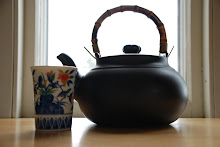
There's a sense of exhilaration that I get when I'm at a conference away from home. The novelty of being in a distant city, the fun of catching up with old friends who come from afar as well, and the excitement of meeting people for the first time; all these energize me as I go from lecture to lecture, trying to absorb bits of information, the latest findings and guidelines in medicine.
This year, the annual spring conference was in Toronto. Having been disappointed in the availability of decent tea and stymied in my attempts to brew it in a hotel room in past years, I brought along my own stash of tea from home. Hours before my flight, I assiduously packed spoonfuls of dry tea leaves into disposable tea filters, stashing them in a metal canister, hoping for the best when I pass through customs. There were enough of the Yunnan black for both E and me for the morning as well as an ample supply of Silver Needles for the early afternoon -when I envisioned myself rushing back to the hotel room, between talks, from the adjacent convention center to brew a cup of the much-needed tea, then heading back to slog through several additional hours of lectures.
On the first morning in Toronto, E and I went downstairs to breakfast. I was not expecting much in the way of potable tea and had already pulled out the metal canister from my luggage in anticipation of brewing tea later in our hotel room after breakfast.
But I was pleasantly surprised. A wooden box holding a variety of loose leaf tea stood between the espresso machine and a large stand of bagels. Present were English Breakfast, chai, Lung Ching Dragonwell, White Peony, and some tisanes. I chose the chai blend to go with my carb-laden breakfast, the briskness of the black tea a fitting counterpoint to my generously-buttered raisin toast.
In the afternoons, there was tea at the Red Tea Box, a funky teahouse in an even funkier neighborhood of Queen Street West. The first day, E and I sat at the back and looked out onto a leafy alcove. Inside, we were amidst the fading brocade of rocking chairs and settees. We shared a pot of Jasmine Pearls, picked at Asian-inflected small plates, and shared perfect-looking pieces of confectionery.
There were more pots of tea later: Lung Ching the next day at the Red Tea Box, more jasmine over bowls of rice with friends in Chinatown, a large pot of hot ginger milk tea with E late at night while surrounded by tweens in a bubble tea shop.
Days later, I am at home. The trees are almost in full bloom, the cherry blosssoms more luxuriant than I remember them to be - the contrast emphatic in my mind, seeming further away than a mere week ago.














